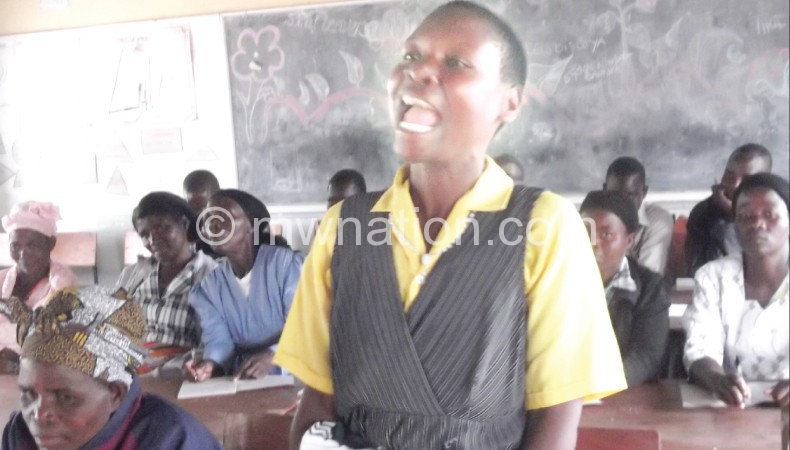Curbing early marriages the Mulanje way

Fifteen-year-old Ellen Namaona got into marriage last year.
The orphaned girl, who comes from Namphungo village, Traditional Authority (T/A) Juma in Mulanje, saw marriage as a solution to her plight.
“I look after my four siblings who became happy when I said I was getting married because they were sure that my husband will help me to feed them,” says Ellen.
But things did not turn out as expected.
“Apart from living in an abusive marriage, I also realised that I made a wrong choice by dropping out of school to enter into marriage,” she says.
Fortunately, with the help of Namphungo Mother Group, Ellen managed to move out of that marriage. She is currently learning at Namphungo Day Secondary School eyeing nursing and midwifery as her dream career.
Namphungo Mothers Group—which receives guidance on girls’ empowerment from Creative Centre for Community Mobilisation (Crecom)—removes girls from marriages in T/A Juma’s area and they facilitate their return to school.
One of the Mother Group’s members, Cecelia Weruzani, says the aim of the group is to ensure that girls are going to school not marriage.
She adds that as mothers they have realised that marriage can wait while education cannot.
“We tell girls in this area that they should not engage in love affairs because that is the beginning of the journey into early marriages. Most girls are in marriages because they were impregnated. We do not want this to happen. Member of Parliament for this area, Patricia Kaliati, is a woman. We want them to take her as their role model,” says Weruzani.
She further notes that in the area, mothers take every girl as their own; as a result, they watch their every step.
“I am not educated myself, but I know that education is a key to development. Therefore, together with my fellow Mother Group members, we don’t want to see girls dropping out of school and settle in marriage,” she says.
Since January this year, Namphungo Mother Group, together with other mother groups in the area, has managed to rescue 12 girls from early marriages. All girls are back to school.
The Mother Group discovered that many girls in the area drop out of school and enter into marriage because of poverty. Weruzani says the Mother Group members contribute money to buy school uniform and other resources for girls’ education.
Group Village Head (GVH) Gumera says efforts by Mother Group members and Crecom have relieved him of the burden of solving problems that emerge in marriages.
“There are a number of marital problems among these young couples. They are many cases of gender-based violence. I believe that if we prevent early marriages, we will prevent gender-based violence in the long run,” says Gumera.
Gumera says together with his fellow chiefs in T/A Juma’s area they have banned overnight dances that youths organise, especially when there is a wedding ceremony.
Crecom programme officer, Maclean Simika, says his organisation is training women in Mulanje, Lilongwe, Kasungu and Mzimba on how they can empower girls to proceed with their children.
“The aim of this project is to enable more girls complete primary school cycle by 2015. Our mandate is to establish and build the capacity of Mother Groups to take part in school management and address social barriers to girl’s education,” says Simika.
Coincidentally, 2015 is also the Gender Links’ deadline for Southern African Development Community (Sadc) countries to achieve gender equality. Simika says having equal numbers of girls and boys at primary school is the beginning of achieving gender equality in Malawi.
A 2011 Unicef report ranks Malawi at position nine out of 25 countries with high numbers of early marriages in the world, a development which Crecom wants to reverse. Simika believes Malawi can do better by curbing early marriages and enroll more girls in primary school.
“Let the girl child go to school not into early marriage. Whether the girl is finding financial problems or not, we want her to leave the marriage and return to school. That is why we train mother groups on how to financially assist needy girls,” says Simika.
Interestingly, men are also joining the Mother Groups in T/A Juma.
“Many men have realised that the fight against early marriage cannot be fought by women only; men as well are against early marriage following the training they got from Crecom,” says Gumera.
Simika says parents should take girls education as a human right issue.
Malawi Human Rights Commission (MHRC) director of child affairs, Norice Chirwa, concurs with Simika saying Malawi should exert more efforts to promote girls’ education if the country is to develop economically.
“If something is not done to stop early marriages, it will be difficult for Malawi to develop economically,” says Mangulama Chirwa.
She adds that it is unfortunate that Malawi is still among 10 African countries that have high numbers of early marriages.






“SCHOOL CAN’T WAIT, MARRIAGE CAN” I LIKE IT.